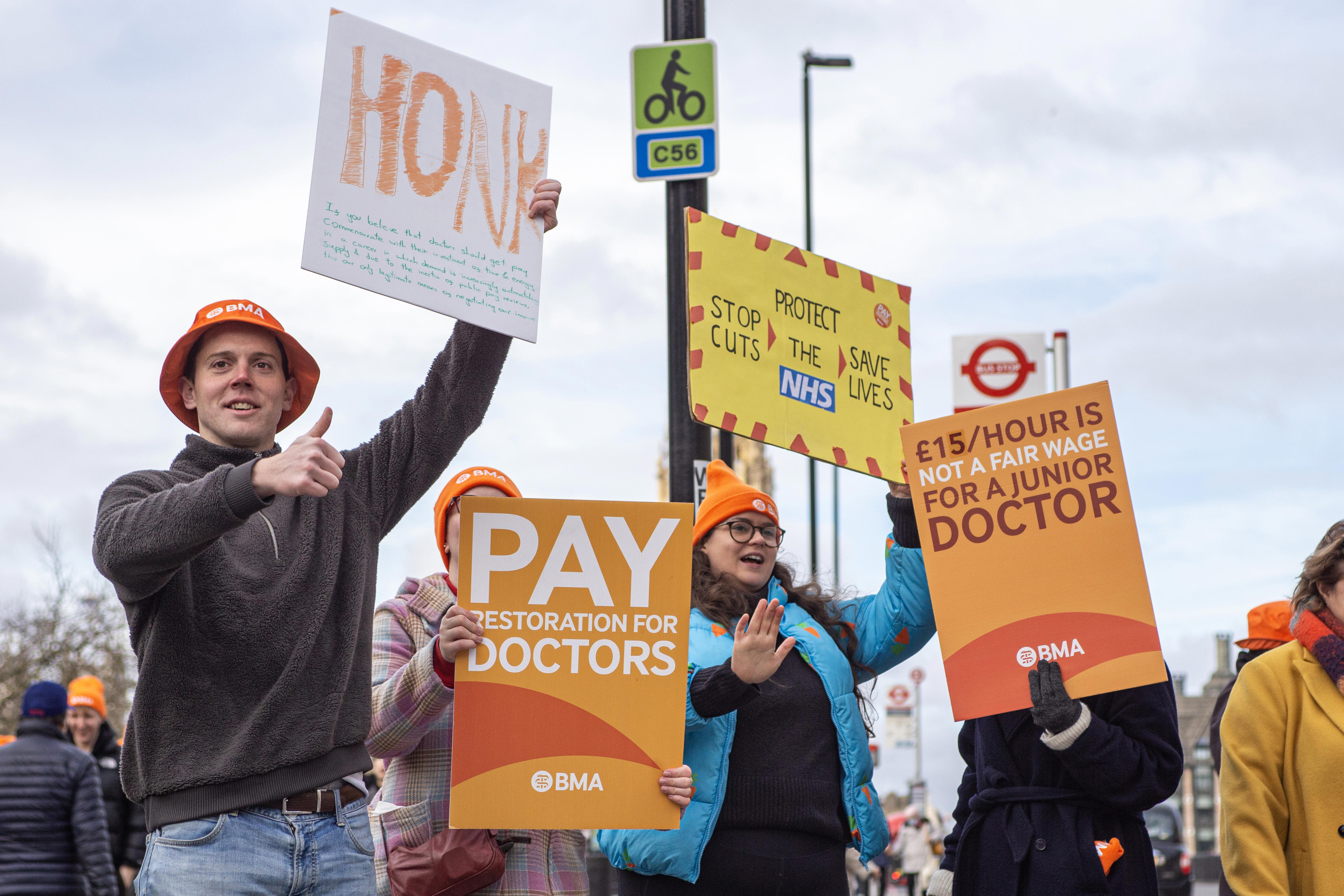‘None of us want to be here,’ says foundation year 2 Callum Parr (pictured above), one of dozens of striking doctors stood on the freezing-cold picket line outside St Thomas’ Hospital in central London.
‘I don’t want to be here, I’d rather be working in [the emergency department] but we’ve been forced back to the picket lines by the Government refusing to give us a credible offer.’
It is now more than a year since junior doctors in England were first balloted on whether to take industrial action on restoring levels of pay which, since 2008, have been eroded in real terms by 26 per cent.
In that time, doctors have staged strike action across England, culminating last month in a 144-hour walkout, the longest of its kind in the history of the NHS.
The latest strikes, which sees doctors in England staging a full 96-hour walkout between 24 and 28 February, is the tenth round of industrial action since 2023.
Valid demands
‘We are getting there but it is a shame it has come to this – 10 rounds of action – for the Government to take our demands seriously,’ reflected South Thames BMA regional junior doctors committee co-chair Daniel Zahedi.
‘We believe our demands are valid, we’ve had two historic ballots, we’re in the process of getting a third, and I’m confident we’re going to get it. It shows there is this level of discontent amongst doctors, but also that we are still united, we still have this strength of resolve to get this dispute done.
 ZAHEDI: Government is rattled
ZAHEDI: Government is rattled
‘Public support still is strong. We can see at the picket lines and you can see it in the opinion polls. I think the Government is rattled. I think they are scared because it has been almost a year of strikes now and we’re still just as strong as we were at the beginning.’
The latest strike action in England resulted after the Department of Health failed to meet an 8 February deadline of presenting a revised offer on pay to the BMA.
While the JDC offered to suspend the strikes in exchange for a four-week extension of the mandate for industrial action by health secretary Victoria Atkins, the absence of such a commitment left thousands of doctors in England with no alternative.
‘Victoria Atkins said she would take 20 minutes to come back and negotiate with us,’ says Dr Parr.
‘That turned into 20 days, which I think it shows that they’re [the Government] not currently serious about giving us that credible offer. The Government chose not to do that, they had the choice of cancelling these strikes and that’s not the option that they took.’
Blood donors
As well as attending the picket at St Thomas’, one of three super picket lines in England along with those in Manchester and Birmingham, Dr Parr is one of many junior doctors who has used the period of industrial action to donate blood for the very first time.
‘There’s a massive shortage of blood in the NHS at the moment, and we’re asking doctors to go and donate while they’re on strike action for these five days,’ he says.
‘I know many colleagues who’ve gone and done it for the very first time and each time you donate blood it can save up to three lives so it's a great initiative.’
The protracted length of the industrial action has taken its toll on the profession and often proved challenging for patients, millions of whom are facing delays to care resulting from a backlog built up during the height of the pandemic.
Despite these pressures public support for the action being taken by junior doctors remains strong, with data gathered ahead of the latest strikes by polling organisation Savanta showing that 53 per cent of those responding backed industrial action.
 Junior doctors strike at St Thomas'
Junior doctors strike at St Thomas'
For BMA junior doctors committee deputy co-chair Sumi Manirajan, the continued support of patients is something she and her colleagues do not take for granted and value deeply.
‘We want the public to be with us on this because we’re doing this ultimately, so they get better care, and we get better doctors in the NHS,’ she says.
‘I think the public have come on this journey with us. They understand that the reason they can’t see their GP or a hospital specialist is because there simply aren’t enough for us.’
With the re-ballot for a fresh mandate for strike action in England open until 20 March, junior doctors elsewhere in the UK have taken similar steps to demand better from their respective governments.
Junior doctors in Wales staged a 72-hour full walkout between 21 to 24 February in response to the below-inflation pay offer of 5 per cent made last August by the Welsh Government.
Out on today’s picket line, BMA junior doctors committee co-chair Rob Laurenson admitted neither doctors nor the Government would have imagined a year ago this duration of the continuing action.
He said, however, that he is under no illusions and remains as determined as ever for a successful resolution to the impasse.
‘I didn't think it would take the Government this long to realise the strength of feeling of doctors, and I don't quite think they realise what a mess they’ve gotten themselves into now, and just how much worse they’re making things,’ says Dr Laurenson.
‘I think doctors very clearly understand what needs to be done and the unity between all doctors has been remarkable for over a year. I think this will go on and on and on, until the doctors finally see the credible offer that will resolve this dispute.’
(Image credit: Matt Saywell/BMA)

